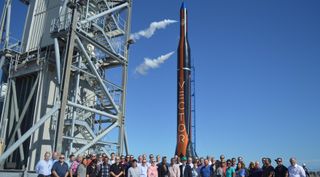Vector Replaces CEO Amid Reports of Financial Problems
The launch company has ceased operations for now.

Updated 12:45 a.m. Eastern Aug. 10 with company statement.
PARK CITY, Utah — Small launch vehicle company Vector has replaced its founding chief executive and disclosed that financial difficulties have forced the company to suspend its operations.
"Jim Cantrell is no longer with Vector effective today. John Garvey has assumed the role of CEO," a company spokesperson told SpaceNews Aug. 9. The company provided no reason for Cantrell's removal or other information about the status of the company.
In a statement issued late Aug. 9, the company said financial issues forced the company to suspend its operations as it seeks to find a way to complete development of its Vector-R small launch vehicle.
Related: Vector's Microsatellite-Launching Rocket in Images
"In response to a significant change in financing, Vector Launch Inc (Vector) announced today that it is undertaking a pause of operations," it stated. "A core team is evaluating options on completing the development of the company's Vector-R small launch vehicle." That team will also support other work, like a recently awarded Air Force launch contract, the company said, promising more details next week.
The statements came after industry rumors and social media posts earlier in the day suggesting serious problems at the company. One employee reported that the company’s three offices — in Tucson, Arizona; Huntington Beach, California and San Jose, California — had been closed, affecting at least 150 employees.
Get the Space.com Newsletter
Breaking space news, the latest updates on rocket launches, skywatching events and more!
Today I went to work. I was running about 20 minutes later than normal. I was excited to stay late and get work done. It was my dream job. I moved across the country to live my dream of working on rockets.Today, that dream ended.August 9, 2019
"We weren't really told much," said Madison Telles, an engineer at Vector, in a series of tweets, saying she and others were taken by surprise. "We had a great concept and great team of people behind it, but things fell through I guess."
Industry sources claim that one of Vector's largest venture capital backers, Sequoia, withdrew its funding for the company. Sequoia did not immediately respond to a request for comment, nor did Cantrell or Garvey.
Cantrell and Garvey founded Vector in 2016, incorporating technology from Garvey's previous company, Garvey Spacecraft Corporation. The company planned to develop a series of launch vehicles providing dedicated launch of small satellites. The company also announced plans for its own software-defined satellites, called Galactic Sky.
The company found success raising capital from funds like Sequoia. The company announced in October 2018 a $70 million Series B round, and had raised a total of about $100 million.
After performing a pair of low-altitude suborbital test flights, Cantrell said in early 2018 that he expected the first launch of the Vector-R rocket to take place before the end of the year. However, the company has yet to attempt an orbital launch. Company officials said earlier this summer that they were planning at least another suborbital test flight from Pacific Spaceport Complex – Alaska on Kodiak Island, Alaska, later this year.
"We're having a suborbital launch hopefully this summer," said Greg Orndorff, vice president of government sales for Vector, during a June 6 panel discussion at the National Space Society's International Space Development Conference. “Stay tuned for launch news.”
In a June 12 statement announcing the hiring of Stephanie Koster, a former Blue Origin executive, as chief financial officer, the company said it now “dedicates focus” on an orbital launch attempt from Alaska later this year.
The shakeup at Vector comes only two days after the company won a launch contract from the U.S. Air Force. The $3.4 million contract for the Agile Small Launch Operational Normalizer (ASLON)-45 mission falls under the Small Rocket Program-Orbital (SRP-O) program run by the Space and Missile Systems Center’s launch enterprise experimental division at Kirtland Air Force Base. The ASLON-45 mission, scheduled for launch in the third quarter of 2021 from Wallops Island, Virginia, will carry multiple three-unit and larger U.S. government cubesats to a 45-degree low Earth orbit.
- Read SpaceNews for the Latest Space Industry News
- Vector to Perform First Orbital Launches from Virginia
- Vector Performs Second Test Flight of Smallsat Launch Vehicle
Caleb Henry contributed to this article from Washington. This story was provided by SpaceNews, dedicated to covering all aspects of the space industry.
Join our Space Forums to keep talking space on the latest missions, night sky and more! And if you have a news tip, correction or comment, let us know at: community@space.com.

Jeff Foust is a Senior Staff Writer at SpaceNews, a space industry news magazine and website, where he writes about space policy, commercial spaceflight and other aerospace industry topics. Jeff has a Ph.D. in planetary sciences from the Massachusetts Institute of Technology and earned a bachelor's degree in geophysics and planetary science from the California Institute of Technology. You can see Jeff's latest projects by following him on Twitter.
Most Popular


